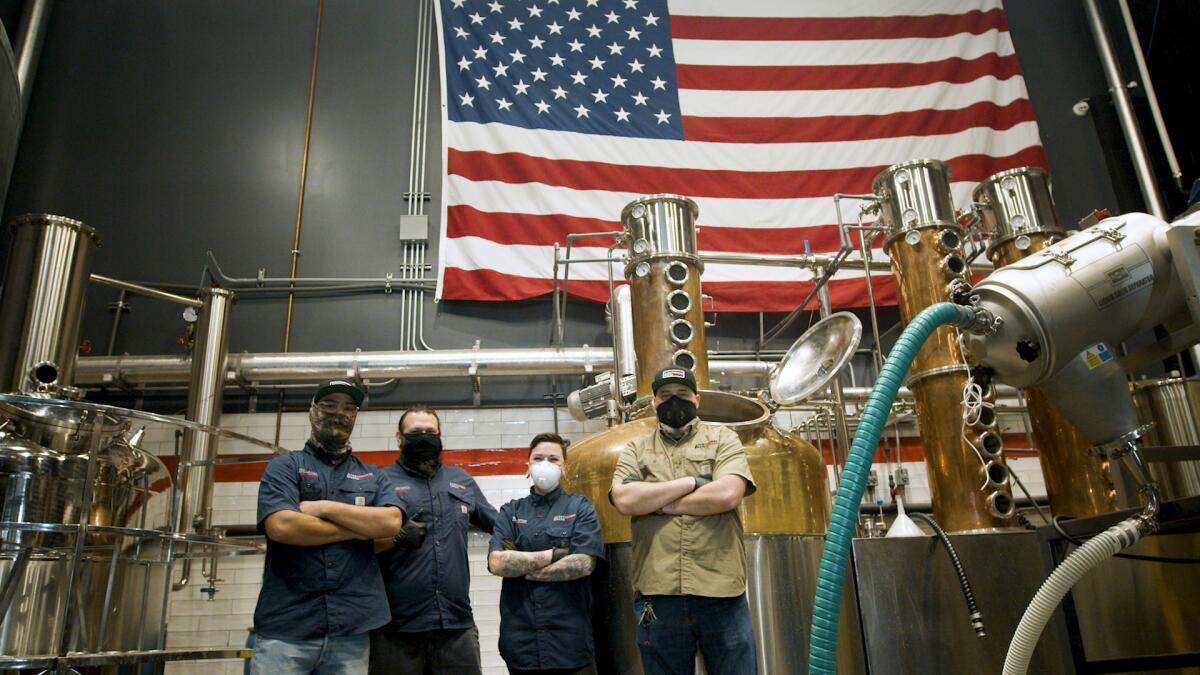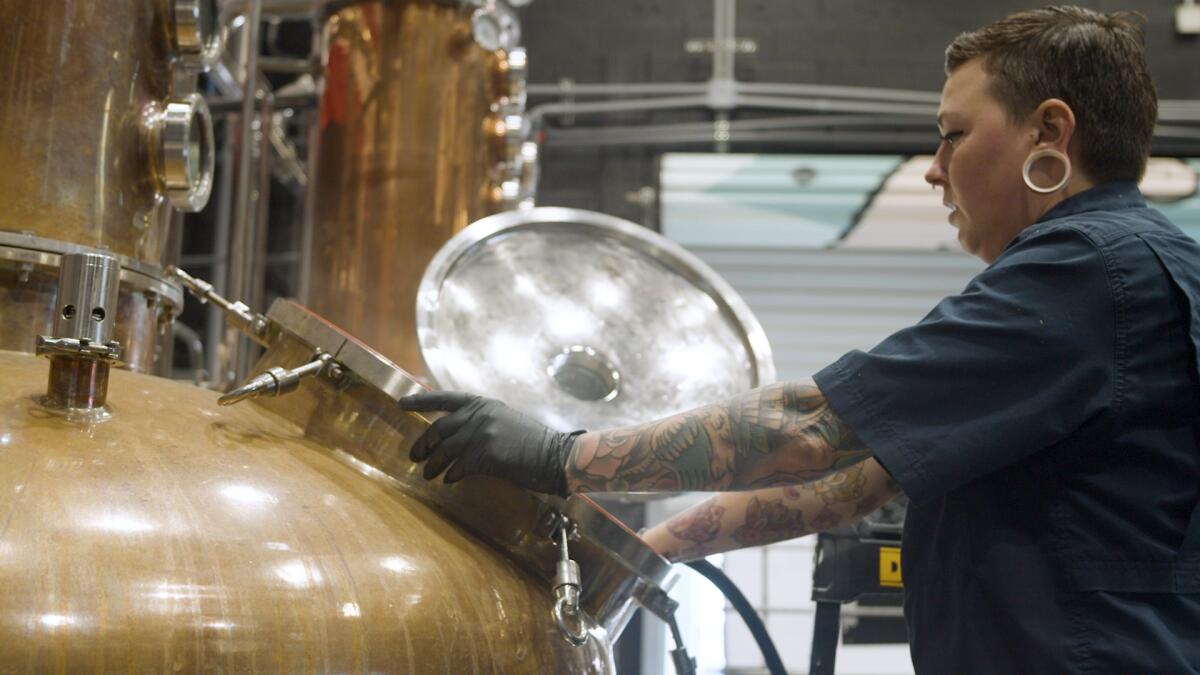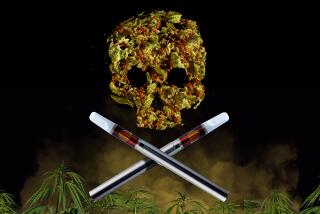Inside a Long Beach distillery churning out hand sanitizer to battle COVID-19

- Share via
The floor is sticky, and the air smells like booze.
At Portuguese Bend Distilling in Long Beach, a skeleton crew in medical masks and Carhartt work shirts clambers around the copper still and stainless-steel fermenters that, in normal days, would be churning out vodka and gin.
But these aren’t normal days.
The little distillery, with its steampunk vibe and a gigantic American flag on the wall, now exudes a kind of pandemic patriotism. The alcohol is flowing, and it’s being used not for cocktails but for something desperately needed to fight the novel coronavirus: hand sanitizer.
“There’s just no alcohol out there,” said Simon Haxton, the master distiller and part-owner.
Over the last two weeks, the federal Alcohol and Tobacco Tax and Trade Bureau issued emergency regulations allowing distilleries to immediately start producing hand sanitizer, and the U.S. Food and Drug Administration eased restrictions on the making and distributing of it.
Small local distilleries like Portuguese Bend and Blinking Owl Distillery in Santa Ana have rallied to the cause.
“We’re the little guys. We can do it,” said Riahna Bjornsen, a Portuguese Bend distillery staffer with flowers tattooed on her arm and a modern-day Rosie the Riveter attitude. Besides working here, she’s an adjunct professor of communications at Chaffey College in Rancho Cucamonga (now teaching classes online because of COVID-19). She said she was made for times like these, when long hours and creative solutions are demanded.
“I feel like I’ve trained my whole life for this,” she said.
Portuguese Bend had to close its restaurant to in-house diners on March 17 because of escalating stay-at-home orders. It had some leftover neutral-grain, high-proof alcohol meant for vodka, and the staff figured they would make a bit of sanitizer to help out the community.
But word got out fast.
“We realized that there wasn’t any in the grocery stores, that people were having a hard time finding it,” Haxton said. “We said, ‘OK, we’ll put it in little bottles and give it away when people come and pick up food.

“Before you know it, we were starting to get phone calls from the utility companies, from the post office, hospitals, police departments.”
Homeland Security came and picked up some bottles. Tesla called. So did Southern California Edison. Torrance Memorial Hospital wanted to place a huge order.
It’s all been a bit... overwhelming.
The distillery, named after the Portuguese Bend area on the Palos Verdes Peninsula that was a hotbed for rum smuggling during Prohibition, typically produces 100 to 150 gallons of alcohol a week. It hopes to double or even triple its production of non-potable alcohol for the hand sanitizer, and even that won’t be enough to meet demand.
“The numbers that are coming in are pretty staggering,” Haxton said.
The distillery crew is just Haxton and three others.
A few days ago, when the bar and restaurant were reduced to takeout and delivery only, Haxton had to lay off 85% of his staff. The waiters. The bartenders.
It was a gut punch for the distillery, which just opened last June.

“They’ve been ride-or-die, with us since the beginning,” Haxton said of the staff. “We just really don’t have any money coming in.”
For now, he hopes his former staffers are able to get unemployment benefits and stimulus checks soon.
In the empty restaurant, an old wooden fishing boat is suspended from the ceiling. The boat is named, appropriately, Moonlighting. The bar is now lined with white 1-gallon plastic jugs. Their labels have the Portuguese Bend Craft Distillery logo and the words: HAND SANITIZER NON-STERILE SOLUTION.
In these days of shortages, even the jugs and bottles for the hand sanitizer have been hard to come by. Haxton said they’ve converted a few cosmetic containers with spray pumps into sanitizer bottles.
The distillery makes the sanitizer alcohol out of corn, using an FDA formula that requires it to be denatured, meaning it has additives such as acetone or methanol to make it foul-tasting and poisonous so people don’t drink it.
The alcohol is mixed with hydrogen peroxide and glycerin and —voila! — hand sanitizer is born.
Andy Carlos, a bearded distillery worker in a black face mask and black disposable gloves, feels lucky to still be working — and at a job he loves — right now, with so many people losing work.
There’s just so much demand for hand sanitizer, and only so much they can make. Carlos compared it to working at an animal shelter, seeing all the cats and dogs and wanting to take them all home.
“We just wish we could do more,” he said.
It’s unclear how long Portuguese Bend will be in the emergency hand sanitizer business. Could be weeks. Could be months.
It certainly wasn’t what Haxton pictured when the distillery opened last summer.
“We haven’t had our one-year anniversary,” Haxton said. “There’s a lot of products we still have yet to make. I’m looking forward to making the whiskeys, and I never would have thought that instead of making the best whiskey in the world we’d be making hand sanitizer.
“But here we are.”
More to Read
Sign up for Essential California
The most important California stories and recommendations in your inbox every morning.
You may occasionally receive promotional content from the Los Angeles Times.











